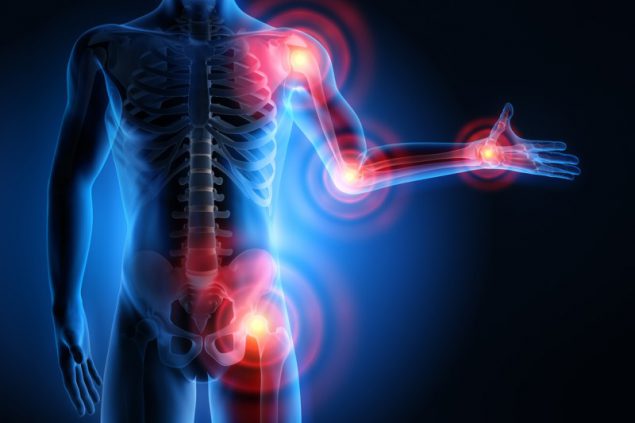ARTHRITIS IN A NUTSHELL
Rheumatoid arthritis (RA) is a systemic inflammatory disease characterized by an autoimmune response that causes pain and disfigurement in peripheral joints.
What is Rheumatoid Arthritis?
Rheumatoid arthritis (RA) is a systemic inflammatory disease that causes pain and disfigurement of peripheral joints. The disease may alternate between “flares” and periods of remission, but is generally progressive. Importantly, patients with RA are at a significantly higher risk of cardiovascular disease.
The disease is characterized by an autoimmune response that can damage joints and cause systemic inflammation. The inflammation is caused by the immune system mistakenly attacking the soft tissue in joints, causing damage and dysfunction.
Natural interventions like curcumin, Boswellia serrata extract, and white peony extract may help reduce inflammation and improve overall health in patients with RA.
What are the Signs and Symptoms of Rheumatoid Arthritis?
- Joint inflammation (swollen, warm, painful)—may be worse in the morning
- Fatigue
- Malaise
- Weight loss
- Damage to other areas of the body may occur as well. Some symptoms may include ulcers on the skin, coughing or shortness of breath, high cholesterol, and anemia.
What are the Conventional Medical Treatments for Rheumatoid Arthritis?
- Disease-modifying antirheumatic drugs (DMARDs) (eg, methotrexate and sulfasalazine)
- Glucocorticoids (eg, prednisone)
- Non-steroidal anti-inflammatory drugs (NSAIDs)
- Statins to prevent cardiovascular disease
What are Emerging Therapies for Rheumatoid Arthritis?
- Modified-release prednisone to improve on the action of conventional prednisone
- Stem cell treatment
- Bioidentical hormone replacement therapy
What Dietary and Lifestyle Changes Can Benefit Rheumatoid Arthritis?
- Avoid foods that cause sensitivities (elevated IgG antibodies)
- Exercise (dynamic aerobic exercise and/or strength training)
What Natural Interventions May Benefit Rheumatoid Arthritis?
- Undenatured type-II collagen. When immune cells encounter exposed joint collagen in RA patients, an autoimmune attack is launched, resulting in inflammation. Consuming undenatured type-II collagen may help the immune system develop “oral tolerance,” teaching the T cells to ignore collagen encountered in joints.
- Essential fatty acids. Omega-3 and certain omega-6 fatty acids are recommended for many RA patients because they can reduce inflammation and improve cardiovascular health. Fatty acids derived from fish oil have been shown to reduce RA pain and improve cholesterol and triglyceride levels.
- Vitamin D. Vitamin D plays an immunomodulatory role and can improve pain relief in RA patients taking DMARDs.
- Vitamin B6. Treatment with vitamin B6 reduced levels of pro-inflammatory cytokines in patients with RA. Patients with RA are also more likely to be deficient in vitamin B6.
- White peony extract. Multiple studies have shown that white peony extract has immunomodulatory, anti-inflammatory, and pain-relieving activity. The extract can reduce symptoms on its own and improve patient response to other treatments.
- Curcumin. Curcumin is a well-known anti-inflammatory compound. It has been shown to be as effective as an NSAID in treating RA-related activity.
- Boswellia serrata extract. The anti-inflammatory extract of the Boswellia sacra tree can improve joint flexion, reduce swelling, and prevent cartilage degradation in arthritic patients.
- Pomegranate. Pomegranates are rich in antioxidant polyphenols. Animal studies and small clinical trials have demonstrated pomegranate’s ability to help with arthritic pain and inflammation.
- Other plant extracts and compounds such as andrographis, green tea, ginger, and quercetin may help reduce inflammation as well.
- Supplemental forms of several endogenous compounds may be important for preventing inflammation and damage, including S-adenosyl-L-methionine (SAMe), glucosamine, and chondroitin sulfate.

